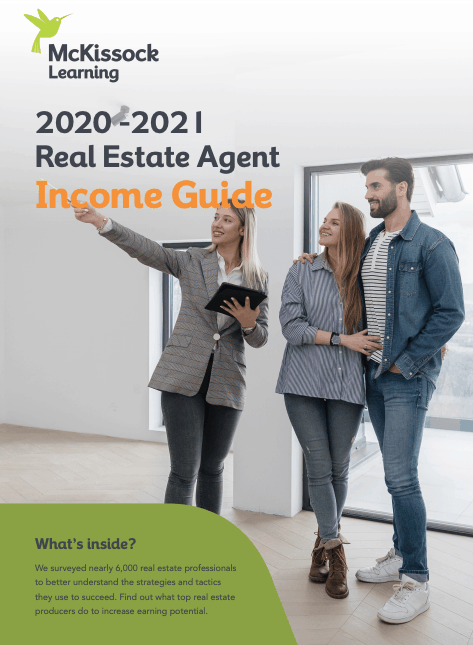 Due to the overwhelming success of our inaugural Real Estate Agent Income Guide in 2018 and 2019, McKissock Learning is back with an all-new guide stuffed with the latest income statistics from licensed real estate professionals across the United States.
Due to the overwhelming success of our inaugural Real Estate Agent Income Guide in 2018 and 2019, McKissock Learning is back with an all-new guide stuffed with the latest income statistics from licensed real estate professionals across the United States.
In December of 2020, we reached out to thousands of licensed real estate agents and brokers to better understand the tactics and strategies used to drive income.
Having received almost triple the number of responses from last year at just under 6,000 participants, this year’s guide casts a more accurate picture of what real estate professionals are earning and the factors that influence those earnings.
While some insights remained the same (real estate agents still boast a higher career satisfaction rating compared to the average worker in the United States), there were others that were a bit more surprising. Below are some highlights from the guide. (To access the full guide, click this link).
Insight #1: Real estate income is on the rise
Despite fluctuations in the real estate market, 65% of real estate agents reported earning more in 2019 than they did in 2018. This statistic is even higher for real estate brokers, with 78% of brokers reporting earning more in 2019 than they did the previous year.
One of the great things about real estate is that many times you get out what you put in. Whereas with salaried jobs you will earn a set amount each year, with real estate the income potential is unlimited. Download the guide to find tips and tricks to increase your income potential.

Insight #2: Top earners set goals for themselves
In this new question from last year’s survey, we asked participants to assess themselves on their goal-setting capabilities. Those who responded as experts in goal-setting earned an average of $41,088 more compared to those who indicated that they fail at setting goals.

Insight #3: It pays to specialize
Similar to last year’s results, this year’s results clearly show that specializing in a niche is key to earning more income. This year, the most profitable niche was luxury real estate with an average income of $83,508, while last year’s most profitable niche was foreign investment with an average income of $111,293.

Insight #4: Investing in yourself is money well spent
While some individuals may be hesitant to invest in their professional development and education, those who do see significant returns. Participants who indicated that they were experts at investing in professional development reported an average income of $86,545, while those who indicated that they failed in this area reported an average income of $36,123.
There are many ways you can invest in your professional development. From taking online classes to attending conferences and webinars to having a personal coach guide your way, investing in yourself has never been easier and more affordable.







